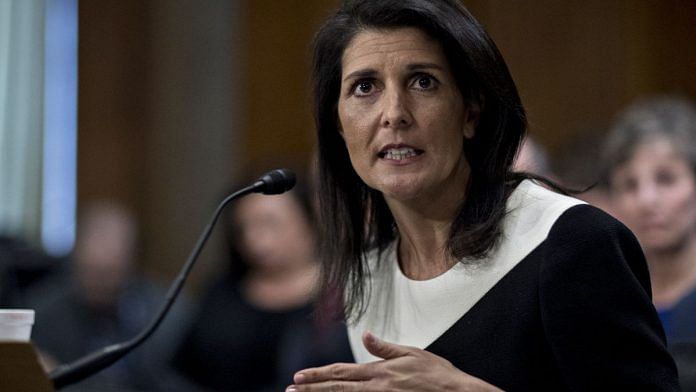There were moments when Haley’s foreign policy differed with Trump’s and even UN’s philosophy. She did not think all countries are equal.
The highlight of Nikki Haley’s tenure as US ambassador to the United Nations came in the third week of December 2017. The General Assembly was preparing to vote to condemn the US for moving its embassy in Israel to Jerusalem, and Haley was having none of it.
There is a great photo of her voting against the draft resolution and casting a stern, side-eye stare at her colleagues. There is her tweet warning that she “will be taking names” of countries that voted later in the week to condemn America’s decision yet still wanted to receive US foreign aid. The American right — from wonky neocons to MAGA populists — swooned.
With the news that Haley will leave office at the end of the year, I thought of that showdown nearly a year ago. The conventional wisdom then from Trump’s critics was that Haley had needlessly bullied the envoys of other nations. It was an embarrassment to treat the hallowed halls of the secretariat building like a Mafia social club. Diplomats are supposed to persuade, not alienate.
Despite Haley’s stern warning, and others like it, she has proved effective. As I wrote at the time, the same week that Haley promised to take names, she won two unanimous votes at the UN Security Council to ratchet up sanctions on North Korea and tighten the screening of potential foreign fighters leaving Syria. In July Haley managed to get approval for an overhaul of the UN peacekeeping budget, cutting costs and streamlining the bureaucracy.
Haley didn’t always press for reform. She also announced in July that the US will be leaving the UN Human Rights Council, accusing it of providing cover for the world’s most inhumane regimes while focusing its condemnation exclusively on the world’s only Jewish state.
A fair criticism of Haley’s tenure is that in her defense of the universal rights of all people, she did not manage to win the support of her boss at the White House. President Donald Trump has too often flattered the kind of tyrants that Haley scolds.
So there were moments when Haley’s foreign policy was in tension with Trump’s. The best example came in April, when Haley went on the Sunday talk shows to promise new sanctions on Russia for its role in abetting the Syrian regime after a chemical weapons attack. White House officials walked it back the next day. When White House economic adviser Larry Kudlow suggested Haley may have been confused, the ambassador responded: “With all due respect, I don’t get confused.”
This tension reflects a wider rift within the Republican Party. Traditional conservatives embrace American exceptionalism and chafe at the UN vision of a community of nations, all deserving equal respect. Trump takes a different view. As he said in his address to the UN General Assembly last month: “I honour the right of every nation in this room to pursue its own customs, beliefs and traditions. The United States will not tell you how to live or work or worship. We only ask that you honour our sovereignty in return.”
In this respect, Trump might be called a transactionalist. Haley is clearly an exceptionalist. In a speech last May at the International Republican Institute, she said the UN’s “foundational dilemma” was that “it is set up to treat all countries the same.” She went on: “But all countries are not fundamentally the same. When you try to pretend that there is no difference between the good guys and the bad guys, that’s always a win for the bad guys.”
Haley proved it’s possible to speak plainly about the bad guys and still gain their cooperation. It’s a record that would make any diplomat proud — and a lesson her soon-to-be-former boss might take to heart. –Bloomberg






